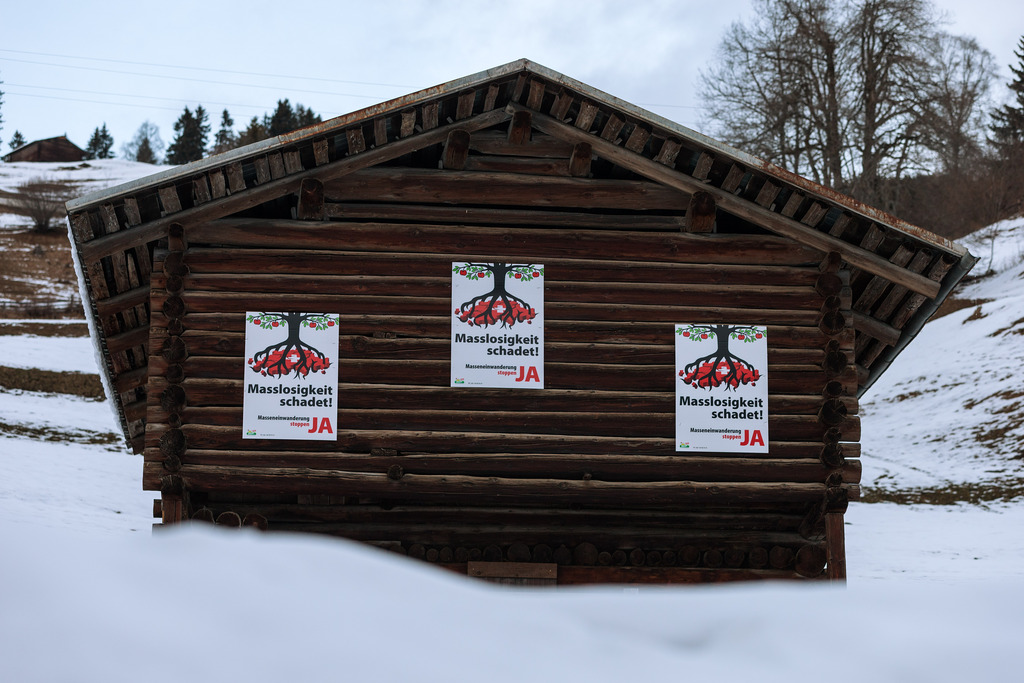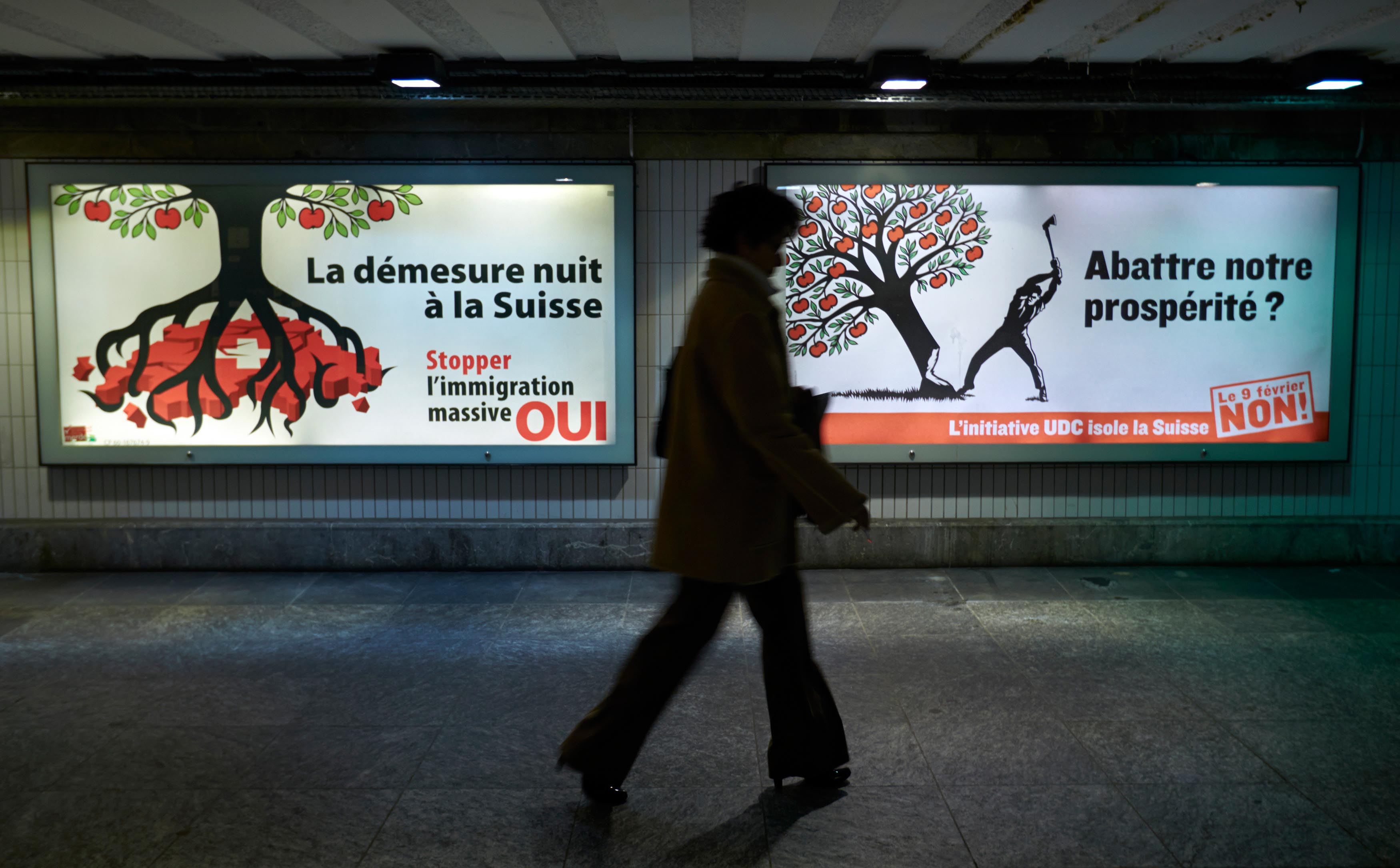Will the EU give Switzerland the cold shoulder?

Governments across the European Union have reacted generally negatively to the result of the Swiss anti-immigration vote. However, the relationship is unlikely to end in a bitter divorce.
“This will clearly have implications for the rest of the agreements we have with Switzerland,” said European Commission spokeswoman Pia Ahrenkilde shortly after Sunday’s vote.
Representatives of the EU member states are set to decide on Thursday whether to proceed with talks about an institutional accord with Switzerland. For the time being, the EU’s diplomatic body, the External Action Service, is hedging its bets, preferring to wait for clarifications promised by the Swiss cabinet.
However, should the Swiss say they can no longer sign the extension of the free movement accord with the EU to its newest member Croatia, the reaction promises to be swift.
Talks concerning the integration of Switzerland into the latest EU research and education programmes would be suspended immediately and the institutional discussions would also be frozen.
The institutional accord is a deal breaker. The EU has repeatedly said that the method of bilateral agreements is outdated. It wants an institutional framework to be created so that, when necessary, all accords would be adjusted to the community “acquis” – the body of EU law.
But Switzerland rejects any measure which would force it to adjust automatically to developments in EU law, seeing this as an attack on its sovereign rights.
The EU has tied any negotiations on future accords, in particular an agreement on energy policy, to the resolution of the institutional issue. On Tuesday, the EU suspended talks on energy, stating that the bilateral relationship had to be re-examined before proceeding any further.
Swiss Foreign Minister Didier Burkhalter met the House of Representatives foreign policy committee Tuesday to discuss the outcome of Sunday’s immigration vote. Switzerland’s participation in the EU’s Horizon 2020 research programme and the Erasmus+ student exchange programme were high on the agenda.
Negotiations concerning Swiss participation are currently underway, but after the immigration vote result, there are no guarantees that a deal can be reached according to Burkhalter.
Committee president Carlo Sommaruga warned that the EU has linked the results of the talks underway to the extension of the free movement accord to its newest partner, Croatia. But there are doubts the additional protocol will be signed or ratified.
Burkhalter said that the government would focus first on the implementation of Sunday’s vote decision, before considering the effect on the free movement accord and future relations with the EU. He did not outline any concrete measures.
Core value
Ahrenkilde warned that the EU considered the free movement of people to be one of its core values and that Switzerland’s decision to impose limits on immigration would force the EU to reconsider its relationship with the Swiss.
There is also the question of the so-called “guillotine clause”: if one of the first package of bilateral agreements signed in 1999, which includes the free movement accord, is not extended or is cancelled, either party has the right to terminate all the others.
For the EU, the Swiss government must decide how it intends to apply the result of the immigration vote. “Brussels will then consider how any measures affect relations with Switzerland and react accordingly,” said Pat the Cope Gallagher, president of the European parliament’s delegation for relations with Switzerland.
The EU is unlikely to take kindly to any suggestion of quotas for migrants. However, it has yet to decide how much leeway it will give the Swiss, according to observers.
There seems to be little sympathy for the Swiss. “Sunday’s result means we will probably have to review the bilateral accords signed in 1999,” said France’s European affairs minister, Thierry Repentin in Brussels, where he was taking part on Monday in a meeting of the EU’s foreign ministers.
Blocher’s fault
The Swiss government has three years to implement the result of Sunday’s vote. “We still think there’s time,” said British the foreign minister, William Hague.
The Europeans aren’t blaming the Swiss government for the outcome of the vote either. The real culprit was Christoph Blocher, figurehead of the rightwing Swiss People’s Party, according to Luxembourg’s foreign minister, Jean Asselborn.
“Mr Blocher, the chief of this idea, might have lots of money, but I think he is short-sighted. You can see the kind of people who share his ideas: Wilders, Le Pen, Strache – he’s in good company,” Asselborn said, referring to the leaders of far-right parties in the Netherlands, France and Austria respectively.
But not everyone thinks the result is such a bad thing. Former French prime minister François Fillon said it was “perfectly natural” for the Swiss to want to decide how many foreign workers moved to Switzerland based on its capacity to integrate them.
And one of Norway’s two coalition government parties, the anti-immigration Progress Party, has called for a similar vote.
After the Swiss voted against joining the European Economic Area in 1992, the government decided to start sectorial negotiations with the EU.
Switzerland wanted to ensure non-discriminatory access to the internal EU market.
In 1993 the EU declared itself ready to negotiate with Switzerland in seven sectors: free movement of people, technical trade barriers, public procurement, agriculture, land transport, air transport and research. But it was stipulated that the agreements be negotiated in parallel and put into effect simultaneously.
The treaties were legally coupled with a so-called “guillotine clause” to ensure that the agreements come into force as a single unit. Should one of the agreements not be extended or be cancelled, the remaining agreements could also be terminated.
The Bilateral I treaties were accepted by 67.2% of Swiss voters on May 21, 2000 and came into force on June 1, 2002.
The Bilateral II treaties are made up of ten agreements, including on internal security, asylum, environment and culture, the Schengen/Dublin Accords, savings tax and pensions. They were approved by the Swiss parliament in 2004.
(adapted from French by Scott Capper)

In compliance with the JTI standards
More: SWI swissinfo.ch certified by the Journalism Trust Initiative










You can find an overview of ongoing debates with our journalists here . Please join us!
If you want to start a conversation about a topic raised in this article or want to report factual errors, email us at english@swissinfo.ch.